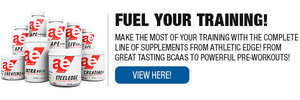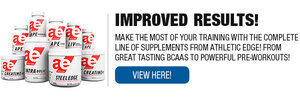01dragonslayer
Ripped
- Jacked Cash
- 472,618
What you consume pre- and post-workout is important. But to maximize your exercise performance, improve recovery, and decrease muscle damage, there’s another window of opportunity you may be missing.
Intra-workout supplementation.
Intra-workout supplementation is the scientific-sounding name for supplementation taken during your workout. So how important is it—and does it make a difference?
Given all the hype-driven product-pushing that exists these days, you might wonder if this is just another marketing-invented category of supplements with no real benefit.
The truth is, intra-workout supplementation is rooted in scientific data and highly beneficial to anyone looking to accelerate their progress and boost their recovery.
If you've been too skeptical to ever try an intra-workout supplement, or if you've tried an improperly formulated product, it's time to learn what intra-workout supplementation is and why it works.

Sports scientists began to research carbohydrates, adding different types and concentrations to water. They looked at how the human body metabolizes carbohydrates and measured performance outcomes and absorption rates into the blood.
The results: Adding carbohydrates to water—In specific ratios to avoid digestive discomfort—was more effective than drinking water alone.
Unfortunately, this area of sports nutrition stagnated for the next 30 years. At the time, sports performance nutrition science was a new concept and very slow to grow. Athletes, coaches, and nutritionists were also typically unfamiliar with exercise physiology and uneducated on the topic of supplementation.

Because of that lack of understanding, intra-workout supplementation was generally oversimplified. During training, the human body's most efficient fuel sources are muscle glycogen (stored carbohydrates in the muscle), liver glycogen (stored carbohydrate in the liver), and glucose (sugar in the blood).
Both fat and protein are less efficient energy sources. With this knowledge, many people simply relied on carbohydrates for mid-workout energy, due to the common misconception that anything else would be less effective.
While technically true, this belief was too narrow in focus. Intra-workout supplementation involves a lot of other factors. To gain a more advanced understanding, those in the sports nutrition industry needed to ask (and answer) many more questions.
Related: Should I Take High Molecular Weight Carbs During My Workout?
It wasn't until the early to mid-1990s that this area of sports science experienced a renewed interest. Sports scientists began to study key research areas, such as:
Research has shown that during high-intensity training (including HIIT, repeated sprints, or similar workouts) a two to three percent decrease in one's body water weight causes a significant drop in performance, reduced number of repetitions completed during a workout, and higher ratings of perceived exertion.1,2
To avoid these negative effects and perform at your highest level, drink six to 12 ounces of water every 15 to 20 minutes during exercise. Simply put, stay hydrated!

But once you’re properly hydrated, you can look to amino acids to create your optimal intra-workout supplement.
Why amino acids? A high concentration of amino acids in the bloodstream during exercise significantly increases exercise-induced protein synthesis (muscle building). Taking in quick-absorbing amino acids during your workout also helps to fight the catabolic (muscle breakdown) effects of exercise, boost recovery, and decrease muscle soreness.3,4
And why is the intra-workout timing so crucial? Exercise increases blood flow to working muscles by up to 500 percent, boosting amino-acid delivery to skeletal muscle by 650 percent.
Cellular sensitivity is also heightened at that time, meaning your muscles can absorb substrates and fuel at a higher, faster rate during exercise. The bottom line is there's no other point in time when your body is more primed for nutrient absorption.
Related: BCAA Supplements Guide - Powders, Benefits, & Products
Granted, drinking water alone can be a challenge during high-intensity training and similar workouts. But the good news is you don't have to drink quick-absorbing amino acids during exercise to boost your performance and recovery. The key is that the amino acids are in your bloodstream during your workout.
When it comes down to it, the pre-workout time frame blends into the intra-workout period, and each influences the other's nutrient composition. So if you take in these amino acids pre-workout, you can experience the same benefits.5
One of the old arguments against intra-workout supplementation held that additional amino acids were unnecessary for athletes who eat a protein-rich diet.
More specifically, it argued that if we eat plenty of protein throughout the day, then taking extra amino acids—even if they are absorbed more quickly and used differently by the body—would have no impact on protein synthesis and muscle recovery. We now know that to be incorrect based on more recent scientific research.
Those who train in the morning in a fasted state or those who are in contest preparation on a low-calorie diet will typically get the biggest boost from amino-acid supplementation during their workout.6

If you’re looking for an extra edge when it comes to exercise, intra-workout supplementation may be your missing link. This small tweak to your nutrition plan can have a big impact in boosting your performance and maximizing your recovery. It’s as simple as staying adequately hydrated and adding the right mix of amino acids to your water.
You work hard, and you’re willing to put in the time and commitment to meet your goals. You know there are no shortcuts on the path to big achievements. But, there are smart strategies, like intra-workout supplementation, to help you maximize your progress and reach your goals faster.
Intra-workout supplementation.
Intra-workout supplementation is the scientific-sounding name for supplementation taken during your workout. So how important is it—and does it make a difference?
Given all the hype-driven product-pushing that exists these days, you might wonder if this is just another marketing-invented category of supplements with no real benefit.
The truth is, intra-workout supplementation is rooted in scientific data and highly beneficial to anyone looking to accelerate their progress and boost their recovery.
If you've been too skeptical to ever try an intra-workout supplement, or if you've tried an improperly formulated product, it's time to learn what intra-workout supplementation is and why it works.

How intra-workout supplementation has evolved
Intra-workout supplementation started out as drinking water and staying hydrated, and that’s still absolutely essential for high performance. But, in the hopes of further improving performance and recovery, people started to explore other options for what they could drink during workouts beyond plain water.Sports scientists began to research carbohydrates, adding different types and concentrations to water. They looked at how the human body metabolizes carbohydrates and measured performance outcomes and absorption rates into the blood.
The results: Adding carbohydrates to water—In specific ratios to avoid digestive discomfort—was more effective than drinking water alone.
Unfortunately, this area of sports nutrition stagnated for the next 30 years. At the time, sports performance nutrition science was a new concept and very slow to grow. Athletes, coaches, and nutritionists were also typically unfamiliar with exercise physiology and uneducated on the topic of supplementation.

Because of that lack of understanding, intra-workout supplementation was generally oversimplified. During training, the human body's most efficient fuel sources are muscle glycogen (stored carbohydrates in the muscle), liver glycogen (stored carbohydrate in the liver), and glucose (sugar in the blood).
Both fat and protein are less efficient energy sources. With this knowledge, many people simply relied on carbohydrates for mid-workout energy, due to the common misconception that anything else would be less effective.
While technically true, this belief was too narrow in focus. Intra-workout supplementation involves a lot of other factors. To gain a more advanced understanding, those in the sports nutrition industry needed to ask (and answer) many more questions.
Related: Should I Take High Molecular Weight Carbs During My Workout?
It wasn't until the early to mid-1990s that this area of sports science experienced a renewed interest. Sports scientists began to study key research areas, such as:
- The effect on our muscles’ structural protein components when they get worked out and overloaded.
- How our muscles are broken down and how they can optimally build back up during the recovery process.
- Other types of fatigue that are not caused by lack of carbohydrates and how to address them.
- How different types of training and different nutritional needs should be taken into consideration when making intra-workout recommendations.
Why hydration and amino acids are so beneficial
First, know that the most important component of intra-workout supplementation, hydration, is still the most basic one. Losing even a small percentage of your body’s water weight can have a negative effect on your workout performance.Research has shown that during high-intensity training (including HIIT, repeated sprints, or similar workouts) a two to three percent decrease in one's body water weight causes a significant drop in performance, reduced number of repetitions completed during a workout, and higher ratings of perceived exertion.1,2
To avoid these negative effects and perform at your highest level, drink six to 12 ounces of water every 15 to 20 minutes during exercise. Simply put, stay hydrated!

But once you’re properly hydrated, you can look to amino acids to create your optimal intra-workout supplement.
Why amino acids? A high concentration of amino acids in the bloodstream during exercise significantly increases exercise-induced protein synthesis (muscle building). Taking in quick-absorbing amino acids during your workout also helps to fight the catabolic (muscle breakdown) effects of exercise, boost recovery, and decrease muscle soreness.3,4
And why is the intra-workout timing so crucial? Exercise increases blood flow to working muscles by up to 500 percent, boosting amino-acid delivery to skeletal muscle by 650 percent.
Cellular sensitivity is also heightened at that time, meaning your muscles can absorb substrates and fuel at a higher, faster rate during exercise. The bottom line is there's no other point in time when your body is more primed for nutrient absorption.
Related: BCAA Supplements Guide - Powders, Benefits, & Products
Granted, drinking water alone can be a challenge during high-intensity training and similar workouts. But the good news is you don't have to drink quick-absorbing amino acids during exercise to boost your performance and recovery. The key is that the amino acids are in your bloodstream during your workout.
When it comes down to it, the pre-workout time frame blends into the intra-workout period, and each influences the other's nutrient composition. So if you take in these amino acids pre-workout, you can experience the same benefits.5
One of the old arguments against intra-workout supplementation held that additional amino acids were unnecessary for athletes who eat a protein-rich diet.
More specifically, it argued that if we eat plenty of protein throughout the day, then taking extra amino acids—even if they are absorbed more quickly and used differently by the body—would have no impact on protein synthesis and muscle recovery. We now know that to be incorrect based on more recent scientific research.
Those who train in the morning in a fasted state or those who are in contest preparation on a low-calorie diet will typically get the biggest boost from amino-acid supplementation during their workout.6

If you’re looking for an extra edge when it comes to exercise, intra-workout supplementation may be your missing link. This small tweak to your nutrition plan can have a big impact in boosting your performance and maximizing your recovery. It’s as simple as staying adequately hydrated and adding the right mix of amino acids to your water.
You work hard, and you’re willing to put in the time and commitment to meet your goals. You know there are no shortcuts on the path to big achievements. But, there are smart strategies, like intra-workout supplementation, to help you maximize your progress and reach your goals faster.

